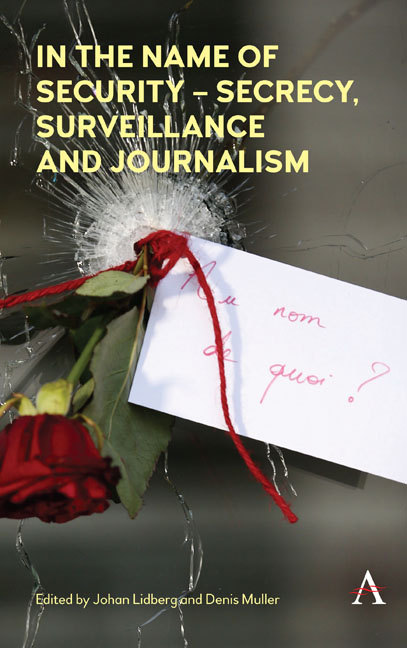Book contents
- Frontmatter
- Contents
- List of Tables
- Introduction
- Chapter 1 The Public Privacy Conundrum – Anonymity and the Law in an Era of Mass Surveillance
- Chapter 2 Undesirable Types – The Surveillance of Journalists
- Chapter 3 Surveillance and National Security ‘Hyper- Legislation’ – Calibrating Restraints on Rights with a Freedom of Expression Threshold
- Chapter 4 The Ethics of Reporting National Security Matters
- Chapter 5 When One Person's Noble Whistleblower Becomes Another's Poisonous Leaker
- Chapter 6 Who Watches the Watchmen? Access to Information, Accountability and Government Secrecy
- Chapter 7 Eyes and Ears in the Sky – Drones and Mass Surveillance
- Chapter 8 Looking over My Shoulder – Public Perceptions of Surveillance
- Chapter 9 Journalism and National Security in Three BISA Countries – Brazil, India and South Africa
- Chapter 10 Journalism and National Security in the European Union
- Chapter 11 The Security Reporter Today – Journalists and Journalism in an Age of Surveillance
- Conclusion: Journalism and the State of Exception
- Contributors
- Index
Introduction
Published online by Cambridge University Press: 21 June 2018
- Frontmatter
- Contents
- List of Tables
- Introduction
- Chapter 1 The Public Privacy Conundrum – Anonymity and the Law in an Era of Mass Surveillance
- Chapter 2 Undesirable Types – The Surveillance of Journalists
- Chapter 3 Surveillance and National Security ‘Hyper- Legislation’ – Calibrating Restraints on Rights with a Freedom of Expression Threshold
- Chapter 4 The Ethics of Reporting National Security Matters
- Chapter 5 When One Person's Noble Whistleblower Becomes Another's Poisonous Leaker
- Chapter 6 Who Watches the Watchmen? Access to Information, Accountability and Government Secrecy
- Chapter 7 Eyes and Ears in the Sky – Drones and Mass Surveillance
- Chapter 8 Looking over My Shoulder – Public Perceptions of Surveillance
- Chapter 9 Journalism and National Security in Three BISA Countries – Brazil, India and South Africa
- Chapter 10 Journalism and National Security in the European Union
- Chapter 11 The Security Reporter Today – Journalists and Journalism in an Age of Surveillance
- Conclusion: Journalism and the State of Exception
- Contributors
- Index
Summary
So where we are now is in a place where we're living behind one- way mirrors. Corporate America and law enforcement and the national security state know so much about us and we know so little about them. We know so little about what they're doing and how they're doing it. And we can't actually hold our government accountable because we truly don't know what it's doing. (Smith 2014, interview with Barton Gellman, journalist, Washington Post)
In the ongoing stream of events that we call history, there are events that challenge established paradigms and force a shift in the flow of history. The terrorist attacks of 11 September 2001 was one such event. The attacks on US soil by an international network of terrorists arguably provoked the greatest change in the conduct of Western democracy since the end of World War II. Simultaneously, it had an impact on global politics similar in scope to the end of the Cold War, which was marked by the collapse of the Berlin Wall in 1989.
These two events promised very different futures. The end of the Cold War promised a new, more open and peaceful world order, characterised by the democratisation of the former eastern European bloc and the end of the nuclear- deterrence mindset known as mutually assured destruction (MAD). This atmosphere of promise was abruptly shattered by the terrorist attacks of 9/11. Those events unleashed an entirely new series of wars, most of which continue to the present day. They began in 2003 as a war of pre- emption engaged in by the United States against Iraq, and continued in 2005 as a war of retribution against Afghanistan for suspected harbouring of the terrorist leaders responsible for the 9/11 attacks – particularly Osama bin Laden, the figurehead of the terrorist network al- Qaeda. These missions were launched under the political slogan the ‘war on terror’, and pushed the world into a new, fear- driven security paradigm (Schmitt 2005).
- Type
- Chapter
- Information
- Publisher: Anthem PressPrint publication year: 2018



